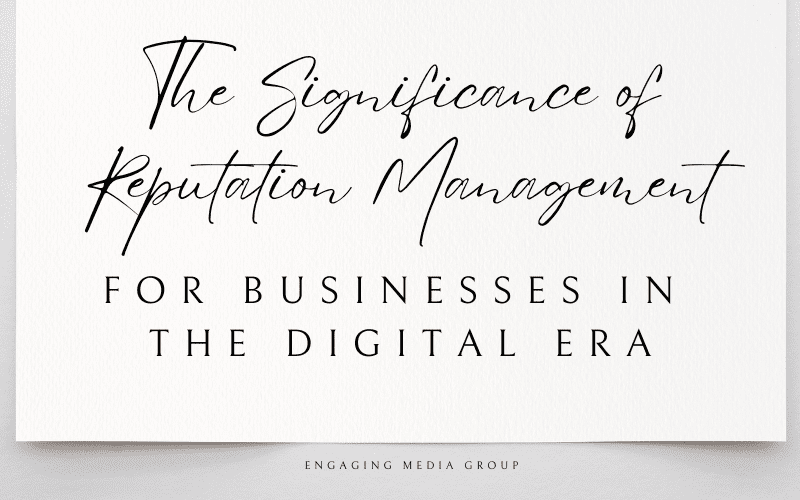Reputation management has become a critical aspect of running a successful business. With the prevalence of online reviews, social media, and instantaneous communication, a business’s reputation can be shaped and influenced more easily than ever before. This blog post explores the importance of reputation management for businesses in the modern era. We will delve into the impact of online reputation, discuss the reasons why reputation management is crucial, and provide actionable insights on how businesses can effectively manage and safeguard their reputation.
The Impact of Online Reputation
- The Digital Shift: Influence of the Internet on Reputation
The advent of the internet and social media platforms has given individuals a powerful voice to express their opinions and experiences. Online reputation has a significant impact on consumer decision-making, with customers relying heavily on reviews and online feedback.
- The Power of Online Reviews and Ratings
Online reviews and ratings play a pivotal role in shaping a business’s reputation. Customers increasingly rely on these testimonials to make informed decisions, and positive reviews can serve as powerful social proof while negative reviews can have detrimental consequences.
- Amplified Reach and Viral Potential
With social media’s widespread use, news and information can spread rapidly. A single negative incident or customer complaint can go viral, potentially causing substantial damage to a business’s reputation if not effectively managed.
Why Reputation Management Matters
Trust and Credibility: Reputation management is crucial for building and maintaining trust and credibility with customers. A positive reputation enhances brand perception, instills confidence, and helps differentiate a business from competitors.
Influence on Customer Decision-Making: Consumers heavily rely on online reputation when making purchasing decisions. A study by BrightLocal revealed that 85% of consumers trust online reviews as much as personal recommendations. Businesses with a positive online reputation have a distinct advantage in attracting new customers.
Competitive Advantage: In a competitive marketplace, a strong reputation can provide a competitive edge. A business with a well-managed reputation is more likely to be chosen over competitors with poor or no online presence.
Customer Loyalty and Advocacy: Reputation management fosters customer loyalty and advocacy. Satisfied customers are more likely to share positive experiences, refer others, and become brand ambassadors, thereby contributing to the business’s growth and success.
Employee Recruitment and Retention: A positive reputation extends beyond customers; it also impacts employee recruitment and retention. Job seekers often consider a company’s reputation when deciding where to work. A strong reputation helps attract top talent and retains existing employees, contributing to a positive company culture.
Effective Reputation Management Strategies
Proactive Monitoring and Listening: Businesses need to monitor their online presence and actively listen to customer feedback. Regularly tracking online reviews, social media mentions, and industry forums allows businesses to address issues promptly and demonstrate responsiveness.
Encouraging and Responding to Reviews: Actively encouraging customers to leave reviews and promptly responding to both positive and negative reviews are essential reputation management practices. Responding to negative feedback in a professional and empathetic manner demonstrates a commitment to customer satisfaction.
Transparency and Open Communication: Transparency is key to managing reputation. Businesses should be open and transparent in their communication, addressing customer concerns, providing accurate information, and acknowledging mistakes when they occur.
Building a Positive Online Presence: Businesses should invest in building a positive online presence through content marketing, social media engagement, and thought leadership. Sharing valuable content, participating in industry discussions, and showcasing expertise help shape a favorable reputation.
Addressing and Resolving Issues: When issues or negative feedback arise, businesses should take swift action to address and resolve them. Effective communication, problem-solving and a commitment to customer satisfaction can turn a negative situation into a positive one.
Nurturing Long-Term Reputation
- Consistency and Quality in Products and Services
Maintaining a good reputation requires consistently delivering high-quality products and services. Businesses should prioritize customer satisfaction, ensuring that every interaction with the brand is positive.
- Empowering Employees as Brand Ambassadors
Employees are crucial stakeholders in reputation management. Businesses should empower and train their employees to become brand ambassadors, aligning their actions with the organization’s values and reputation goals.
- Continuous Improvement and Adaptation
Reputation management is an ongoing process. Businesses should consistently evaluate and adapt their strategies, monitor industry trends, and actively seek feedback to stay ahead and continuously improve their reputation.
Reputation management is an indispensable aspect of running a successful business. The impact of online reputation on consumer decision-making, trust, and competitiveness cannot be understated. By proactively monitoring their online presence, actively listening to customer feedback, and employing effective reputation management strategies, businesses can build a strong reputation, foster customer loyalty, attract new customers, and cultivate long-term success in a highly interconnected digital landscape. Reputation management is an investment that pays dividends in the form of a resilient and positive brand image, increased customer trust, and sustainable growth.

